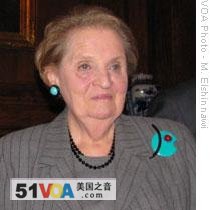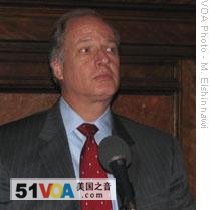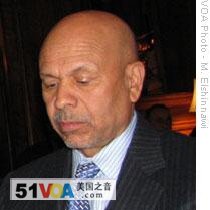Washington, D.C.
24 April 2009
President Barack Obama continued his outreach to the Muslim world in April with a visit to Turkey. There was generally favorable response across the political spectrum in Muslim countries to the president's public statements - such as a pledge made before Turkey's Parliament in Ankara.
"We seek broader engagement based on mutual interest and mutual respect," Obama said. "We will listen carefully, we will bridge misunderstandings, and we will seek common ground. We will be respectful, even when we do not agree."
The president's approach seems to enjoy popular support back home, as well. The latest Washington Post/ABC opinion survey shows that 81 percent of Americans believe it is important for the U.S. to engage the Muslim world.
 |
| Former Secretary of State Madeleine Albright says the president already has taken action to improve relations with Muslim countries |
"In terms of diplomacy and conflict resolution, he did say that resolving the Israeli-Palestinian issue was a major input, and he immediately named Senator George Mitchell as his envoy in order to work on that particular issue," she says. "On Iraq, he made a commitment to a relatively fast drawn down. On Afghanistan and Pakistan, he also felt very strongly that it was very important to deal with as a regional diplomatic issue and has named Ambassador [Richard] Holbrook as his representative in order to deal with issues there."
At the meeting with ambassadors from member states of the Organization of The Islamic Conference, or OIC., Albright laid out the project's strategies for combating Islamic extremism: First, elevate diplomacy as the primary tool for resolving key conflicts involving Muslim countries. Then promote broad-based economic development in those nations, foster mutual respect and understanding between Americans and Muslims, and support efforts to improve governance and promote civic participation in predominantly Muslim societies.
"There is no doubt in my mind that Muslim countries can be democracies," Albright says. "Turkey is a perfect example of that. It is very evident, and, actually, in my study of religions, in many ways Islam is maybe the most democratic religion because there is nobody between you and God. So I do not think that is something that can be used as reason not to have Muslim democracies."
Albright said the members of the Leadership Group on U.S. Muslim Engagement are calling on the Obama administration to continue promoting democracy through diplomacy, not force.
 |
| Former U.S. Rep. Vin Weber says the administration should exert political and economic pressure to promote democratic reforms in the Middle East |
"It is a fact, unfortunately, that the word democracy has become a code word in recent years for regime change and maybe for armed intervention regime change, but at the end of the day, there is a core value that Americans have stood for, that we have to continue stand for, and we can't allow that as well to become a fundamental impediment to improving the relations we are talking about."
Weber said the report recommends fighting poverty and using U.S. political and economic leverage with authoritarian governments to promote democratic reforms and create a middle class and a civil society.
The OIC ambassadors were generally pleased with the report. Moroccan Ambassador Aziz Mekouar called it "a most constructive blueprint for building relationships of cooperation" between the United States and the larger Muslim world.
"I think that President Obama has taken very good steps immediately after he took office by appointing Senator Mitchell as a personal envoy, and he went there several times, and Secretary Clinton also went to the region, so we are seeing more than goodwill," Mekouar says. "We are seeing a lot of actions to try to help solve the conflict in the Middle East on the basis of two-state solution."
 |
| Libya Ambassador Ali Aujali says the Arab world will remain skeptical of American policy in the Middle East until they see concrete changes |
"Until we see this change in American policy in the Middle East, and we see that Americans have shifted from supporting one side against the other side, until we see a clear position of the administration that they will help to stop the new settlements, I think the Arab world still will not believe there is a change in the administration's foreign policy."
In the face of such skepticism, members of the Engagement Project hope their proposed new strategies will help guide the Obama Administration to a more productive dialogue between the United States and the Muslim world.